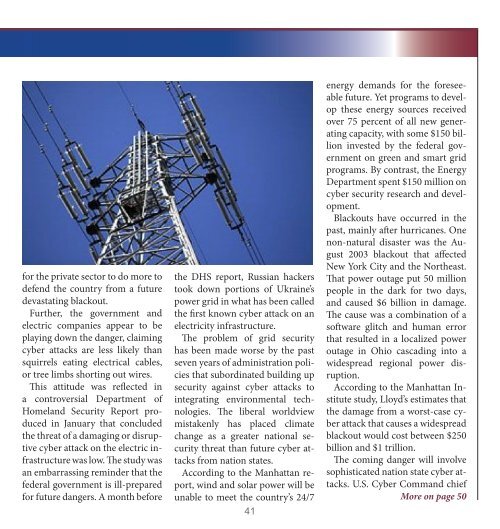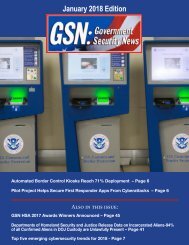GSN_Oct_YUMPU
You also want an ePaper? Increase the reach of your titles
YUMPU automatically turns print PDFs into web optimized ePapers that Google loves.
for the private sector to do more to<br />
defend the country from a future<br />
devastating blackout.<br />
Further, the government and<br />
electric companies appear to be<br />
playing down the danger, claiming<br />
cyber attacks are less likely than<br />
squirrels eating electrical cables,<br />
or tree limbs shorting out wires.<br />
This attitude was reflected in<br />
a controversial Department of<br />
Homeland Security Report produced<br />
in January that concluded<br />
the threat of a damaging or disruptive<br />
cyber attack on the electric infrastructure<br />
was low. The study was<br />
an embarrassing reminder that the<br />
federal government is ill-prepared<br />
for future dangers. A month before<br />
the DHS report, Russian hackers<br />
took down portions of Ukraine’s<br />
power grid in what has been called<br />
the first known cyber attack on an<br />
electricity infrastructure.<br />
The problem of grid security<br />
has been made worse by the past<br />
seven years of administration policies<br />
that subordinated building up<br />
security against cyber attacks to<br />
integrating environmental technologies.<br />
The liberal worldview<br />
mistakenly has placed climate<br />
change as a greater national security<br />
threat than future cyber attacks<br />
from nation states.<br />
According to the Manhattan report,<br />
wind and solar power will be<br />
unable to meet the country’s 24/7<br />
41<br />
energy demands for the foreseeable<br />
future. Yet programs to develop<br />
these energy sources received<br />
over 75 percent of all new generating<br />
capacity, with some $150 billion<br />
invested by the federal government<br />
on green and smart grid<br />
programs. By contrast, the Energy<br />
Department spent $150 million on<br />
cyber security research and development.<br />
Blackouts have occurred in the<br />
past, mainly after hurricanes. One<br />
non-natural disaster was the August<br />
2003 blackout that affected<br />
New York City and the Northeast.<br />
That power outage put 50 million<br />
people in the dark for two days,<br />
and caused $6 billion in damage.<br />
The cause was a combination of a<br />
software glitch and human error<br />
that resulted in a localized power<br />
outage in Ohio cascading into a<br />
widespread regional power disruption.<br />
According to the Manhattan Institute<br />
study, Lloyd’s estimates that<br />
the damage from a worst-case cyber<br />
attack that causes a widespread<br />
blackout would cost between $250<br />
billion and $1 trillion.<br />
The coming danger will involve<br />
sophisticated nation state cyber attacks.<br />
U.S. Cyber Command chief<br />
More on page 50















